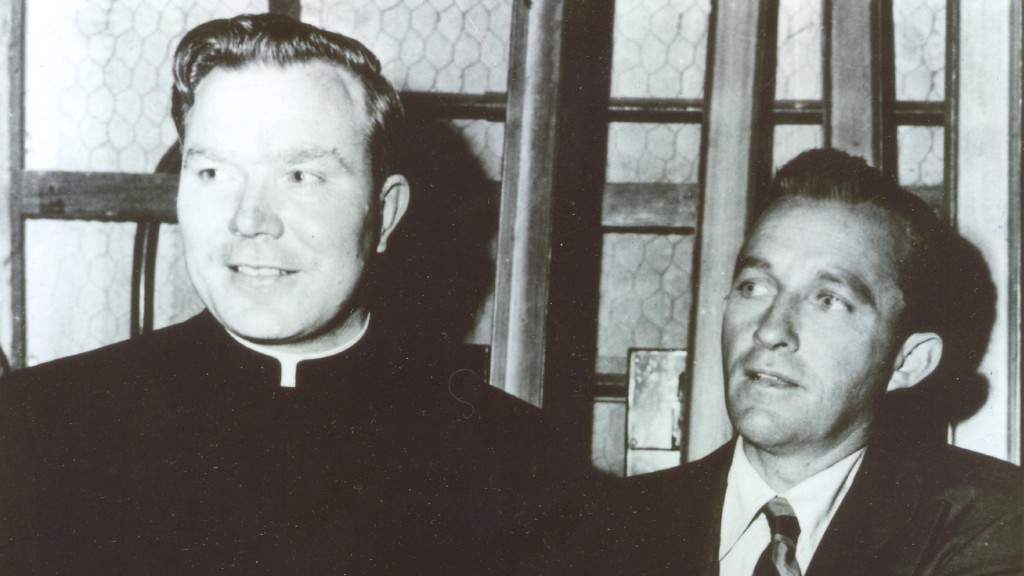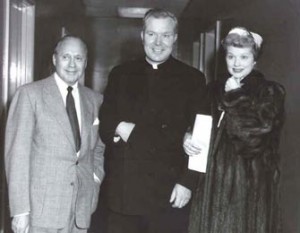Happy Birthday, Father Patrick Peyton!
“The family that prays together stays together.” It’s a sentiment that we’re all very much familiar with, even if the program that popularized that phrase—Family Theater—may not be as well-known. Hosted by a rotation of big-name Hollywood stars (notably Loretta Young), the Mutual series was the brainchild of Father Patrick Peyton, C.S.C.—born on this date in 1909. Family Theater was an extension of the Family Rosary Crusade (Father Peyton himself is often referred to as “The Rosary Priest”), and its lengthy radio and television run was integral in the promotion of family prayer.
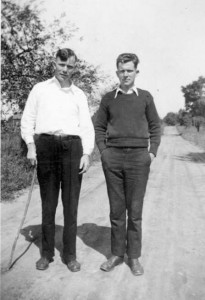 As for Peyton himself, he was a son of the auld soil; born Patrick Joseph Peyton in County Mayo, Ireland. His early teenage years were marked by periods of rebellion and defiance of authority. Although he eventually dropped out of school, his strong family ties and deeply religious nature eventually inspired him to seek out a vocation in the priesthood. Before becoming a man of the cloth, young Patrick eagerly sought to earn a living to help his family, for his father John was ill and unable to work the family’s farm. Several of Peyton’s elder sisters (Patrick was the sixth of nine children) were living in the U.S., sending money to the family, and in 1927 sent word that Patrick and his older brother Thomas should sail to America and join them in Scranton, PA.
As for Peyton himself, he was a son of the auld soil; born Patrick Joseph Peyton in County Mayo, Ireland. His early teenage years were marked by periods of rebellion and defiance of authority. Although he eventually dropped out of school, his strong family ties and deeply religious nature eventually inspired him to seek out a vocation in the priesthood. Before becoming a man of the cloth, young Patrick eagerly sought to earn a living to help his family, for his father John was ill and unable to work the family’s farm. Several of Peyton’s elder sisters (Patrick was the sixth of nine children) were living in the U.S., sending money to the family, and in 1927 sent word that Patrick and his older brother Thomas should sail to America and join them in Scranton, PA.
Upon his arrival in the States in 1928, Patrick had difficulty finding work, but eventually settled for a job as a sexton (janitor) for St. Stanislaus Cathedral under Monsignor Paul Kelly. His custodial duties at St. Stanislaus continued to stoke Peyton’s desire to enter the priesthood, and Monsignor Kelly highly approved…but pressed upon Patrick to finish his high school education. When Father Pat Dolan of the Congregation of the Holy Cross paid the cathedral a visit in search of new seminarians, both Patrick and brother Thomas entered the priesthood in Norte Dame, IN (after getting their high school diplomas at a Holy Cross school).
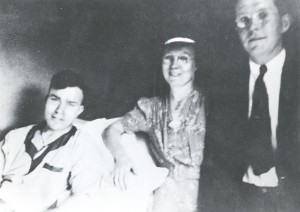 Patrick pursued a B.A. in Philosophy within the University of Notre Dame’s Moreau Seminary beginning in 1932. His career as a priest saw dark clouds on the horizon in 1938, when Peyton was diagnosed with tuberculosis—and he would later credit the attention and prayers from his sister Nellie and Father Cornelius Hagerty (his mentor at Notre Dame) with what was unquestionably a miracle: the patches on his right lung would heal to the utter bewilderment of his doctors. Peyton completed his theology studies at Washington, DC’s Holy Cross College and received a special dispensation from the Vatican (stemming from his illness) in May of 1941, allowing him to be ordained as a priest. He took his vows alongside his brother in June at Notre Dame’s Basilica of the Sacred Heart.
Patrick pursued a B.A. in Philosophy within the University of Notre Dame’s Moreau Seminary beginning in 1932. His career as a priest saw dark clouds on the horizon in 1938, when Peyton was diagnosed with tuberculosis—and he would later credit the attention and prayers from his sister Nellie and Father Cornelius Hagerty (his mentor at Notre Dame) with what was unquestionably a miracle: the patches on his right lung would heal to the utter bewilderment of his doctors. Peyton completed his theology studies at Washington, DC’s Holy Cross College and received a special dispensation from the Vatican (stemming from his illness) in May of 1941, allowing him to be ordained as a priest. He took his vows alongside his brother in June at Notre Dame’s Basilica of the Sacred Heart.
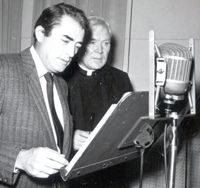 As the Reverend Father Patrick Peyton, C.S.C., Peyton’s first assignment was as chaplain of the Holy Cross Brothers of the Vincentian Institute in Albany, NY. His duties were relatively light (owing to WW2), but Father Patrick established himself as one of the leaders stressing the importance of strengthening families both before and after the war, often through the ritual of praying the Family Rosary. Peyton would also become one of the first mass media evangelicals, chiefly through the radio anthology Family Theater, which premiered over Mutual on February 13, 1947. Family Theater was a sustained series, yet Father Patrick could exercise enormous influence on the crème de la crème of Hollywood—James Stewart, Gregory Peck, Irene Dunne, Henry Fonda, etc.—to appear on the show as either announcers, narrators, or performers on the program. Family Theater presented a good many religious-themed dramas (a total of 540 episodes during its ten-year-run), but occasionally dramatized classic tales such as Moby Dick and Don Quixote.
As the Reverend Father Patrick Peyton, C.S.C., Peyton’s first assignment was as chaplain of the Holy Cross Brothers of the Vincentian Institute in Albany, NY. His duties were relatively light (owing to WW2), but Father Patrick established himself as one of the leaders stressing the importance of strengthening families both before and after the war, often through the ritual of praying the Family Rosary. Peyton would also become one of the first mass media evangelicals, chiefly through the radio anthology Family Theater, which premiered over Mutual on February 13, 1947. Family Theater was a sustained series, yet Father Patrick could exercise enormous influence on the crème de la crème of Hollywood—James Stewart, Gregory Peck, Irene Dunne, Henry Fonda, etc.—to appear on the show as either announcers, narrators, or performers on the program. Family Theater presented a good many religious-themed dramas (a total of 540 episodes during its ten-year-run), but occasionally dramatized classic tales such as Moby Dick and Don Quixote.
While still airing on Mutual, Family Theatre would transition to the small screen in 1951 as a syndicated TV series (the boob tube incarnation swapped “Theater” with “Theatre”), expanded to a full hour, and was hosted by Father Peyton himself. (The TV version would run for seven years, just a little longer than Family Theater’s radio run—which came to a close on September 11, 1957.) Father Patrick continued his day job, hosting popular rosary rallies throughout Latin America. These “Family Rosary Crusades” were not without controversy; Peyton was accused at the time of being a front for American intelligence during his many trips to Latin America, and it was later revealed that The Rosary Priest’s crusades were receiving generous funding from the Central Intelligence Agency. The Vatican pressed upon Father Patrick in 1964 to sever those ties with the CIA, and his reputation eventually recovered. Peyton would continue his good works with the church until his passing in 1992 at the age of 93, and after his death a petition was put forth (in 2001) to promote him as a candidate for sainthood. (As of 2015, it was still undergoing the rigorous bureaucratic process known in the Catholic Church as The Positio.)
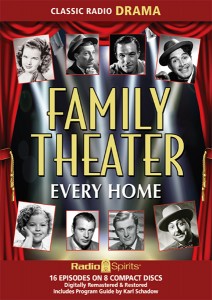 Though the Yuletide holidays have come and gone, Radio Spirits features broadcasts of Father Patrick Peyton’s signature radio series on two of our Christmas CD sets: the Family Theater broadcast of “Ruth” (12-23-53) is available on Christmas Radio Classics, and The Voices of Christmas Past spotlights “Crossroads of Christmas” (from 12-17-52). A frequent guest on the program, Jack Benny, can be heard on Family Theater’s “The Golden Touch” (05-23-51) on the Benny collection Be Our Guest. But for the fullest and finest representation of Family Theater, you need to purchase a copy of Every Home, an eight-CD set featuring stars and radio favorites like Fred Astaire, Shirley Temple, Kirk Douglas, and Ethel Barrymore. Happy birthday to the man who taught us that “A world at prayer is a world at peace.”
Though the Yuletide holidays have come and gone, Radio Spirits features broadcasts of Father Patrick Peyton’s signature radio series on two of our Christmas CD sets: the Family Theater broadcast of “Ruth” (12-23-53) is available on Christmas Radio Classics, and The Voices of Christmas Past spotlights “Crossroads of Christmas” (from 12-17-52). A frequent guest on the program, Jack Benny, can be heard on Family Theater’s “The Golden Touch” (05-23-51) on the Benny collection Be Our Guest. But for the fullest and finest representation of Family Theater, you need to purchase a copy of Every Home, an eight-CD set featuring stars and radio favorites like Fred Astaire, Shirley Temple, Kirk Douglas, and Ethel Barrymore. Happy birthday to the man who taught us that “A world at prayer is a world at peace.”

